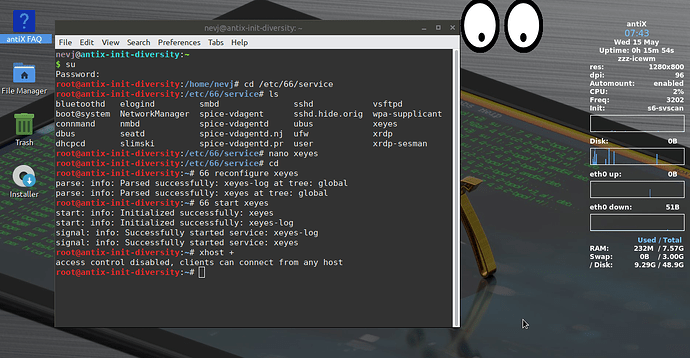Nice one Eric, I managed to get the session tree working on antiX, & the user scandir persists.
$ sudo 66 -z tree status -go name,contents
Name : global
Contents : \
├─dbus-log (pid=1060, state=Enabled, type=classic, tree=global)
├─seatd-log (pid=1067, state=Enabled, type=classic, tree=global)
├─slimski-log (pid=1066, state=Enabled, type=classic, tree=global)
├─connmand-log (pid=1065, state=Enabled, type=classic, tree=global)
├─nmbd-log (pid=1056, state=Enabled, type=classic, tree=global)
├─smbd-log (pid=1057, state=Enabled, type=classic, tree=global)
├─ufw (pid=up, state=Enabled, type=oneshot, tree=global)
├─bluetoothd-log (pid=1068, state=Enabled, type=classic, tree=global)
├─sshd-log (pid=1063, state=Enabled, type=classic, tree=global)
├─scandir@antix:svscan@antix-log (pid=983, state=Enabled, type=classic, tree=global)
├─scandir@antix (pid=up, state=Enabled, type=module, tree=global)
├─dbus (pid=1081, state=Enabled, type=classic, tree=global)
├─seatd (pid=1088, state=Enabled, type=classic, tree=global)
├─nmbd (pid=1083, state=Enabled, type=classic, tree=global)
├─smbd (pid=1078, state=Enabled, type=classic, tree=global)
├─sshd (pid=1087, state=Enabled, type=classic, tree=global)
├─scandir@antix:svscan@antix (pid=990, state=Enabled, type=classic, tree=global)
├─connmand (pid=1105, state=Enabled, type=classic, tree=global)
├─bluetoothd (pid=1106, state=Enabled, type=classic, tree=global)
└─slimski (pid=1104, state=Enabled, type=classic, tree=global)
Name : boot
Contents : \
├─elogind-log (pid=0, state=Disabled, type=classic, tree=boot)
├─dbus-log (pid=1060, state=Enabled, type=classic, tree=global)
├─boot@system:system-hostname (pid=up, state=Enabled, type=oneshot, tree=boot)
├─boot@system:mount-run (pid=up, state=Enabled, type=oneshot, tree=boot)
├─boot@system:mount-tmp (pid=up, state=Enabled, type=oneshot, tree=boot)
├─boot@system:populate-sys (pid=up, state=Enabled, type=oneshot, tree=boot)
├─boot@system:mount-pts (pid=up, state=Enabled, type=oneshot, tree=boot)
├─boot@system:mount-shm (pid=up, state=Enabled, type=oneshot, tree=boot)
├─boot@system:populate-dev (pid=up, state=Enabled, type=oneshot, tree=boot)
├─boot@system:mount-cgroups (pid=up, state=Enabled, type=oneshot, tree=boot)
├─boot@system:system-sysctl (pid=up, state=Enabled, type=oneshot, tree=boot)
├─boot@system:udevd-log (pid=340, state=Enabled, type=classic, tree=boot)
├─boot@system:tty-earlier@tty12 (pid=265, state=Enabled, type=classic, tree=boot)
├─boot@system (pid=up, state=Enabled, type=module, tree=boot)
├─dbus (pid=1081, state=Enabled, type=classic, tree=global)
├─boot@system:populate-run (pid=up, state=Enabled, type=oneshot, tree=boot)
├─boot@system:populate-tmp (pid=up, state=Enabled, type=oneshot, tree=boot)
├─elogind (pid=0, state=Disabled, type=classic, tree=boot)
├─boot@system:mount-branch (pid=up, state=Enabled, type=oneshot, tree=boot)
├─boot@system:system-hwclock (pid=up, state=Enabled, type=oneshot, tree=boot)
├─boot@system:system-random (pid=up, state=Enabled, type=oneshot, tree=boot)
├─boot@system:udevd (pid=455, state=Enabled, type=classic, tree=boot)
├─boot@system:udevadm (pid=up, state=Enabled, type=oneshot, tree=boot)
├─boot@system:system-fontnkey (pid=up, state=Enabled, type=oneshot, tree=boot)
├─boot@system:system-fsck (pid=up, state=Enabled, type=oneshot, tree=boot)
├─boot@system:mount-fstab (pid=up, state=Enabled, type=oneshot, tree=boot)
├─boot@system:system-branch (pid=up, state=Enabled, type=oneshot, tree=boot)
├─boot@system:mount-rw (pid=up, state=Enabled, type=oneshot, tree=boot)
├─boot@system:local-authfiles (pid=up, state=Enabled, type=oneshot, tree=boot)
├─boot@system:mount-swap (pid=up, state=Enabled, type=oneshot, tree=boot)
├─boot@system:local-loop (pid=up, state=Enabled, type=oneshot, tree=boot)
├─boot@system:local-sethostname (pid=up, state=Enabled, type=oneshot, tree=boot)
├─boot@system:local-time (pid=up, state=Enabled, type=oneshot, tree=boot)
├─boot@system:local-dmesg (pid=up, state=Enabled, type=oneshot, tree=boot)
├─boot@system:local-branch (pid=up, state=Enabled, type=oneshot, tree=boot)
├─boot@system:runtime-branch (pid=up, state=Enabled, type=oneshot, tree=boot)
├─boot@system:canopy (pid=up, state=Enabled, type=oneshot, tree=boot)
├─boot@system:tty-rc@tty1 (pid=1193, state=Enabled, type=classic, tree=boot)
└─boot@system:tty-rc@tty2 (pid=1192, state=Enabled, type=classic, tree=boot)
Name : session
Contents : \
├─boot-user@antix:mount-run@antix (pid=up, state=Enabled, type=oneshot, tree=session)
├─boot-user@antix (pid=up, state=Enabled, type=module, tree=session)
├─scandir@antix (pid=up, state=Enabled, type=module, tree=global)
├─scandir@antix:svscan@antix-log (pid=983, state=Enabled, type=classic, tree=global)
└─scandir@antix:svscan@antix (pid=990, state=Enabled, type=classic, tree=global)
Now I just need to create good package debs for antiX.
